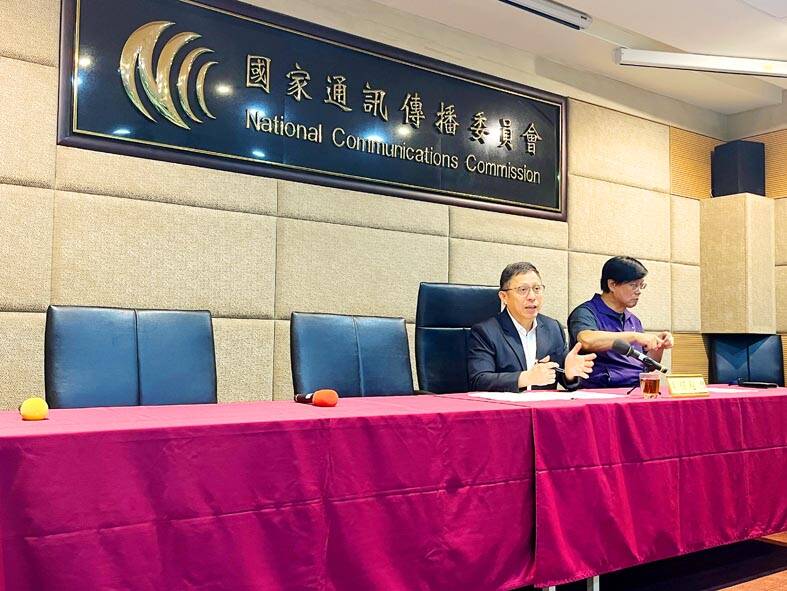Taiwan’s three main telecoms are enacting measures to allow them to track users’ locations using updated National Immigration Agency (NIA) information to prevent abuse of prepaid international phone cards for fraud, the National Communications Commission (NCC) said yesterday.
While prepaid phone cards, especially for international use, are beneficial for international travelers and migrant workers, they are also a loophole exploited by scamming groups, the NCC said.
The Fraud Crime Prevention Act (詐欺犯罪危害防制條例), which passed its third reading last month, would “plug” the loopholes by requiring the telecommunication industry to verify clients’ passport numbers and names before providing international roaming services.

Photo: Tsai Si-pei, Taipei Times
Roaming services can be denied if it does not appear that the applicant has entered Taiwan, the NCC said.
The commission met with Chunghwa Telecom to discuss measures to prevent scams and their efficacy.
New systems are expected to come online by the end of next month, Chunghwa Telecom said.
The NCC said that it would meet with the other two top telecoms, Taiwan Mobile and Far EasTone, to discuss the issues.
Taiwan Mobile and Far EasTone said that they each had their measures to counter scamming that should be available at the end of October.
NCC Chief Secretary Huang Wen-che (黃文哲) said that the companies would be able to apply for access to NIA data to confirm whether an applicant has legally entered Taiwan and has not “hotwired” into the system.
The NCC has also suggested that telecoms restrict or temporarily suspend services for migrant workers who drop out of contact, Huang said.
Asked whether there is a list of high-risk vendors to look out for, Huang only said that last year there was a significant rise in the fraudulent use of China Unicom prepaid cards sold in Hong Kong.
However, the trend has not repeated this year, he said, adding that the NCC would issue standard definitions of high-risk vendors, such as those that sell unidirectional prepaid cards and cards without the need for photo identification.
Meanwhile, the Risk Management Guidelines for Telecommunication Affairs at Telecom Business (電信事業受理申辦電信服務風險管理機制指引) has been amended to prompt telecoms to warn people if their cards register more than 50 text messages sent in a day — excluding commercial texts.
Chunghwa Telecom hoped to set the bar for “expressing concern” at 500 messages for multimedia messaging services, but the NCC has asked it to consider lowering the threshold, Huang said.
The NCC has also asked that Chunghwa Telecom develop more effective identification verification measures and step up management of cases of abnormal behavior, in addition to its warning messages for international phone calls and other issues, he said.

Chinese Nationalist Party (KMT) Chairman Eric Chu (朱立倫), spokeswoman Yang Chih-yu (楊智伃) and Legislator Hsieh Lung-chieh (謝龍介) would be summoned by police for questioning for leading an illegal assembly on Thursday evening last week, Minister of the Interior Liu Shyh-fang (劉世芳) said today. The three KMT officials led an assembly outside the Taipei City Prosecutors’ Office, a restricted area where public assembly is not allowed, protesting the questioning of several KMT staff and searches of KMT headquarters and offices in a recall petition forgery case. Chu, Yang and Hsieh are all suspected of contravening the Assembly and Parade Act (集會遊行法) by holding

PRAISE: Japanese visitor Takashi Kubota said the Taiwanese temple architecture images showcased in the AI Art Gallery were the most impressive displays he saw Taiwan does not have an official pavilion at the World Expo in Osaka, Japan, because of its diplomatic predicament, but the government-backed Tech World pavilion is drawing interest with its unique recreations of works by Taiwanese artists. The pavilion features an artificial intelligence (AI)-based art gallery showcasing works of famous Taiwanese artists from the Japanese colonial period using innovative technologies. Among its main simulated displays are Eastern gouache paintings by Chen Chin (陳進), Lin Yu-shan (林玉山) and Kuo Hsueh-hu (郭雪湖), who were the three young Taiwanese painters selected for the East Asian Painting exhibition in 1927. Gouache is a water-based

Taiwan would welcome the return of Honduras as a diplomatic ally if its next president decides to make such a move, Minister of Foreign Affairs Lin Chia-lung (林佳龍) said yesterday. “Of course, we would welcome Honduras if they want to restore diplomatic ties with Taiwan after their elections,” Lin said at a meeting of the legislature’s Foreign Affairs and National Defense Committee, when asked to comment on statements made by two of the three Honduran presidential candidates during the presidential campaign in the Central American country. Taiwan is paying close attention to the region as a whole in the wake of a

OFF-TARGET: More than 30,000 participants were expected to take part in the Games next month, but only 6,550 foreign and 19,400 Taiwanese athletes have registered Taipei city councilors yesterday blasted the organizers of next month’s World Masters Games over sudden timetable and venue changes, which they said have caused thousands of participants to back out of the international sporting event, among other organizational issues. They also cited visa delays and political interference by China as reasons many foreign athletes are requesting refunds for the event, to be held from May 17 to 30. Jointly organized by the Taipei and New Taipei City governments, the games have been rocked by numerous controversies since preparations began in 2020. Taipei City Councilor Lin Yen-feng (林延鳳) said yesterday that new measures by